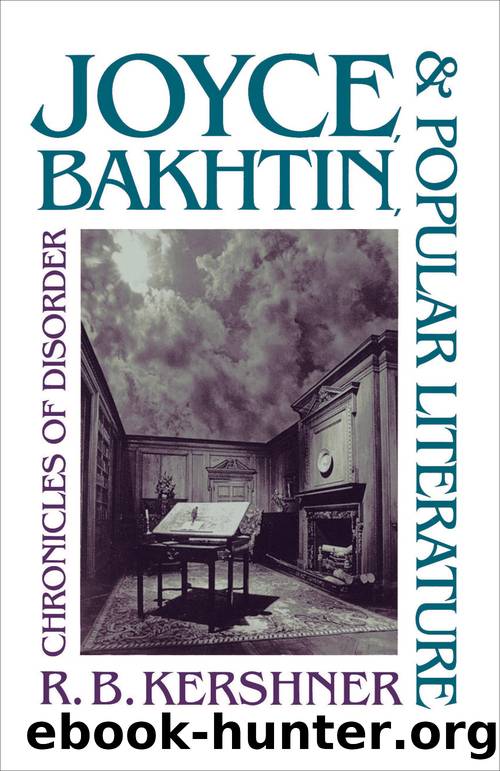Joyce, Bakhtin, and Popular Literature by Kershner R. B.;

Author:Kershner, R. B.;
Language: eng
Format: epub
Publisher: University of North Carolina Press
Published: 1989-03-14T16:00:00+00:00
Tom Brownâs School-Days
Within this dubious context, the first major school story, Thomas Hughesâs Tom Brownâs School Days (1857), appeared as exceptional in several regards. Like his friend Charles Kingsley, Hughes was a Christian Socialist, and unlike him admired Dr. Thomas Arnold, the former headmaster at Rugby, to the point of adulation.19 Tom Brown, published fifteen years after Arnoldâs death, is in part a tribute to âThe Doctor,â in part a surprisingly realistic story set in a real school, and in part an embryonic Bildungsroman featuring âthe English schoolboy as he is popularly supposed to be, tough, gregarious, reckless, a creature of outdoor tastes, intensely loyal to the community to which he belongs.â20 He also appears as a creature of suppressed but profound religious and moral instinct who is nonetheless easily led astray, and whose salvation during these formative years is a chancy matter.
Traditionally enough, Hughes establishes Tomâs rural childhood home in the Vale of White Horse as a place of rather combative innocence, full of mischief-making but without the potential for real moral damage; ironically, Hughes observes that the son of Squire Brown âgot more harm from his equals in his first fortnight at a private school . . . than he had from his village friends from the day he left Charityâs apronstrings.â21 Although Hughes is at pains to present Rugby as a greatly superior alternative to the dubious âprivate schoolsâ of the time, much the same could in fact be said of that institution. As the boy is leaving home, Tomâs father warns him, âYouâll see a great many cruel blackguard things done,â22 an opinion that understates the case. At least by modern standards, and sometimes even by the standards of Britain in 1857, the reader must be taken aback by the organized and random bullying, the wholesale exploitation of the smaller by the larger boys, the organized cheating on examinations, and the recreational destruction of property and livestock belonging to neighboring farmers.
Although he offers occasional apologies for these events, and even assures the reader that some of the abuses have since been corrected, Hughes clearly regards this schoolboy world as natural, even bracing in its moral climate. As soon becomes clear, Rugby is a spiritually Darwinist world where the innocent are exposed to temptation and vice in order that they may overcome them, and where they are unjustly attacked in order that they may learn to demonstrate their manhood. In this system education itself is curiously irrelevant: âthe object of all schools,â Hughes comments, âis not to ram Latin and Greek into boys, but to make them good English boys, good future citizens; and by far the most important part of that work must be done or not done, out of school hours.â23 The true testing ground of boys is sports, particularly football, in this seed-bed of Muscular Christianity, and to a lesser extent social interaction within the community of boys. The boysâ personal relationships to the masters, like their academic accomplishments, are also curiously irrelevant; one
Download
This site does not store any files on its server. We only index and link to content provided by other sites. Please contact the content providers to delete copyright contents if any and email us, we'll remove relevant links or contents immediately.
The Power of Myth by Joseph Campbell & Bill Moyers(1068)
A Social History of the Media by Peter Burke & Peter Burke(988)
Half Moon Bay by Jonathan Kellerman & Jesse Kellerman(987)
Inseparable by Emma Donoghue(983)
The Nets of Modernism: Henry James, Virginia Woolf, James Joyce, and Sigmund Freud by Maud Ellmann(914)
The Spike by Mark Humphries;(812)
The Complete Correspondence 1928-1940 by Theodor W. Adorno & Walter Benjamin(789)
A Theory of Narrative Drawing by Simon Grennan(783)
Culture by Terry Eagleton(776)
Ideology by Eagleton Terry;(743)
World Philology by(719)
Farnsworth's Classical English Rhetoric by Ward Farnsworth(718)
Game of Thrones and Philosophy by William Irwin(712)
Bodies from the Library 3 by Tony Medawar(709)
High Albania by M. Edith Durham(706)
Adam Smith by Jonathan Conlin(695)
A Reader’s Companion to J. D. Salinger’s The Catcher in the Rye by Peter Beidler(689)
Comic Genius: Portraits of Funny People by(654)
Monkey King by Wu Cheng'en(654)
